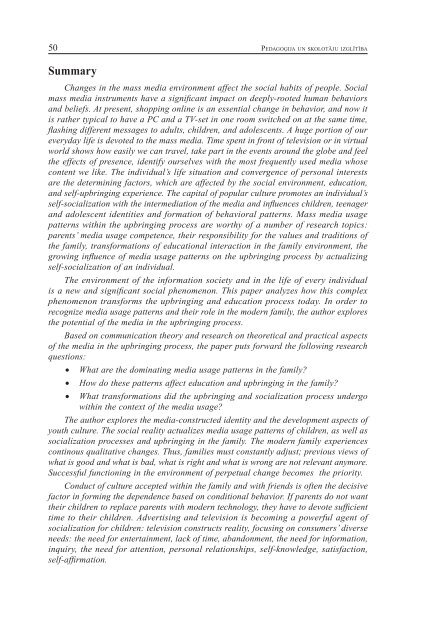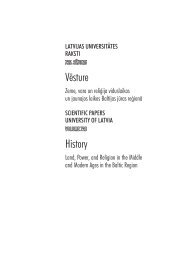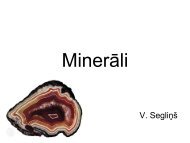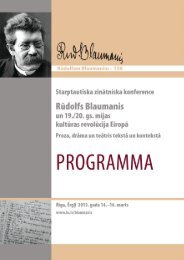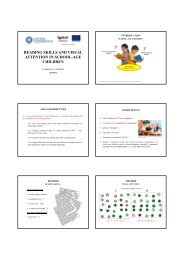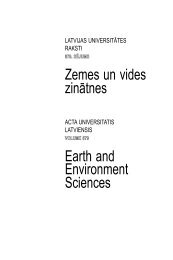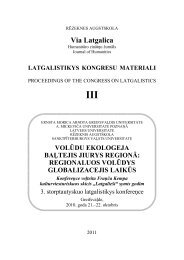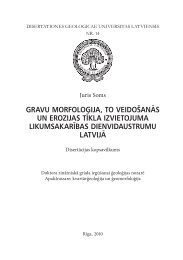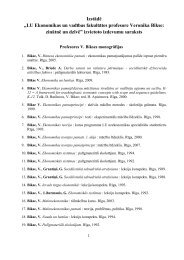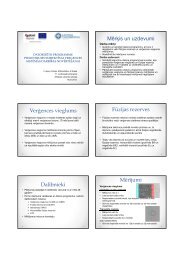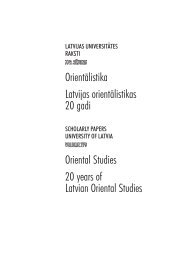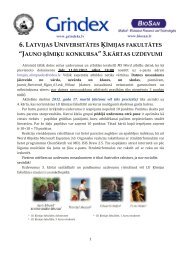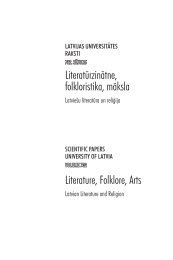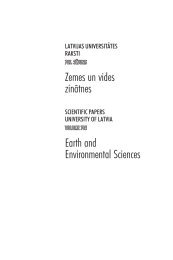You also want an ePaper? Increase the reach of your titles
YUMPU automatically turns print PDFs into web optimized ePapers that Google loves.
50 Pe d a g o ģ i j a un s k o l o t ā j u i z g l ī t ī b a<br />
Summary<br />
Changes in the mass media environment affect the social habits of people. Social<br />
mass media instruments have a significant impact on deeply-rooted human behaviors<br />
and beliefs. At present, shopping online is an essential change in behavior, and now it<br />
is rather typical to have a PC and a TV-set in one room switched on at the same time,<br />
flashing different messages to adults, children, and adolescents. A huge portion of our<br />
everyday life is devoted to the mass media. Time spent in front of television or in virtual<br />
world shows how easily we can travel, take part in the events around the globe and feel<br />
the effects of presence, identify ourselves with the most frequently used media whose<br />
content we like. The individual’s life situation and convergence of personal interests<br />
are the determining factors, which are affected by the social environment, education,<br />
and self-upbringing experience. The capital of popular culture promotes an individual’s<br />
self-socialization with the intermediation of the media and influences children, teenager<br />
and adolescent identities and formation of behavioral patterns. Mass media usage<br />
patterns within the upbringing process are worthy of a number of research topics:<br />
parents’ media usage competence, their responsibility for the values and traditions of<br />
the family, transformations of educational interaction in the family environment, the<br />
growing influence of media usage patterns on the upbringing process by actualizing<br />
self-socialization of an individual.<br />
The environment of the information society and in the life of every individual<br />
is a new and significant social phenomenon. This paper analyzes how this complex<br />
phenomenon transforms the upbringing and education process today. In order to<br />
recognize media usage patterns and their role in the modern family, the author explores<br />
the potential of the media in the upbringing process.<br />
Based on communication theory and research on theoretical and practical aspects<br />
of the media in the upbringing process, the paper puts forward the following research<br />
questions:<br />
• What are the dominating media usage patterns in the family?<br />
• How do these patterns affect education and upbringing in the family?<br />
• What transformations did the upbringing and socialization process undergo<br />
within the context of the media usage?<br />
The author explores the media-constructed identity and the development aspects of<br />
youth culture. The social reality actualizes media usage patterns of children, as well as<br />
socialization processes and upbringing in the family. The modern family experiences<br />
continous qualitative changes. Thus, families must constantly adjust; previous views of<br />
what is good and what is bad, what is right and what is wrong are not relevant anymore.<br />
Successful functioning in the environment of perpetual change becomes the priority.<br />
Conduct of culture accepted within the family and with friends is often the decisive<br />
factor in forming the dependence based on conditional behavior. If parents do not want<br />
their children to replace parents with modern technology, they have to devote sufficient<br />
time to their children. Advertising and television is becoming a powerful agent of<br />
socialization for children: television constructs reality, focusing on consumers’ diverse<br />
needs: the need for entertainment, lack of time, abandonment, the need for information,<br />
inquiry, the need for attention, personal relationships, self-knowledge, satisfaction,<br />
self-affirmation.


